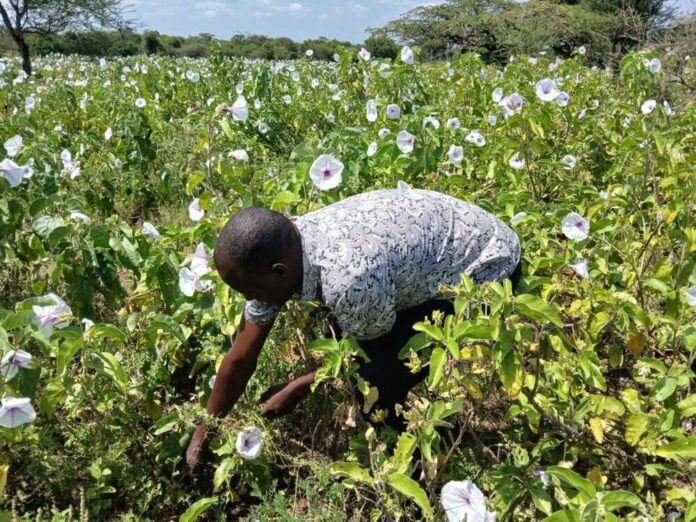By Christine Wangoi Musa, DevReporter, Kajiado County

Quick facts about Ipomea weed.
- Ipomea weed /Morning glory is an evergreen leafy weed with attractive purple flowers with an awful scent.
- The weed is commonly referred to as Oltiame le teti or Orbeneyio in the Maa dialect.
- The weed is not consumed by any herbivores since it is poisonous.
- The weed produces milkish liquid, which irritates the skin.
- Ipomea flowers attract bees, the honey produced from the weed is bitter and causes sleeping disorders.
- Grass cannot grow around the weed, which itself can grow up to two meters long.
- The seeds can survive up to 5years in wait for appropriate weather conditions to sprout.
- Ipomea has since been declared as a “disaster” by the County government of Kajiado.
The fast spreading Ipomea weed has turned into a nightmare for Kajiado farmers, threatening livestock keeping in the County. The leafy weed that spreads quite fast, has occupied large chunks of Rangeland. Grass, where other fodder has become scarce
The weed chokes the growth of grass and other plants to the chagrin of pastoralists, who are struggling to restock livestock following the recent prolonged drought. Pastoralists decry the fact that the pasture they had realized following the recent rains, is not enough and easily available, since the weed has overgrown a large part of the rangelands area.
The weed, which cannot be consumed by any animal, has halted traditional honey harvesting, as the honey is said to cause sleeping disorders.
Locals also cry foul over increased allergies caused by the strong stench from the flowers.
Timothy Kores, a bee farmer in Ilbisil, says that they have come together as farmers and stopped the lucrative and wide honey collection business due to health concerns.
“We have confirmed beyond reasonable doubt, that the honey we are harvesting is dangerous for human consumption. The nectar from the ipomea weed makes honey taste bitter. What shocks us even more, is the abnormal sleep associated with it. Once you consume the honey you become so sleepy, its uncontrollable. Both ourselves, the harvesters; and our children, have tested the honey, and our experience was so scary,” said Kores.
Now the farmers want research institutions to intervene to unravel more information on mysterious weed, whose effects have taken away an important economic activity in the area.
“We make our living by harvesting wild honey, but for now we are jobless. Yet the demand for honey had increased in the recent past, and this had made the business profitable and very lucrative,” adds Kores.
Farmers have noted that the widely spread weed has also affected the beehives, as the strong stench from the flowery weed has become the best option for bees.
Scientist take
Over grazing has been termed as a major cause of the spouting of the weed. Experts further say that the weed encourages growth of other invasive weeds.
“The rate at which ipomoea has depleted pasture in Kajiado is alarming and the risk of losing indigenous grass are very high since the weed encourages the spread of other non-useable vegetation,” said Eric Ahenda, Director of Livestock, Kajiado County.
Mitigation measures
Experts and scientists who have been carrying research on the fast spreading weed, are yet to establish whether the weed has any benefit. What is currently known is that it has adverse effects on the environment.
Uprooting and burning the weed is said to be the only option for containing it.
Kajiado Governor, Joseph Ole Lenku, has since declared the weed a disaster for the county, which now requires urgent interventions to contain it. He has called on the national government and other stakeholders to work hand-in-hand with the county to help eradicate the weed.
Governor Ole Lenku, who launched operation Ng’oa ipomoea at Ilbisil, further says that sensitising local communities on best ways to uproot the weed is required.
More concerted efforts need to be implemented to eradicate the weed, and hence avert compromising inclusive and sustainable food and agriculture systems. Food and nutrition security are among the agendas of Vision 2030.






